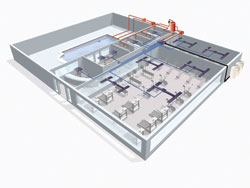MITSUBISHI has stepped out of its box with the launch of a domestic heat pump boiler.
The PQFY VRF Heat Pump boiler is currently being trailed by Persimmons Homes, one of the largest house builders in the UK, in a new executive home in Manchester as part of its investigation into low carbon housing.
The unit is working with a Mitsubishi Electric City Multi air conditioning unit and OSMA underfloor heating to provide three floors of comfort cooling and domestic heating.
More than 80% of the domestic hot water needed in the Persimmon Homes trial will be provided by the PQFY.
However Mitsubishi is targeting commercial – it used examples of a restaurant and leisure centre in its presentation – as well as high end residential applications.
The VRF Heat Pump Boiler can be applied in two basic methods offering either heat pump, or heat pump with heat recovery.
In the heat pump application the system would be dedicated to supplying hot water and Mitsubishi Electric predicts COPs higher than 3.5 resulting in at least 45% less CO2 emissions.
According to Philip Ord, VRF product manager who was instrumental in developing this innovation: “The heat pump boiler generates water at 450C which is ideal for use with the expanding underfloor heating market.”
However to supply the 650C storage temperature necessary for sanitary water a small electric boost heater has been integrated into the storage tank. With the heat pump providing more than 80% of the heating requirement the unit delivers high overall efficiency levels.
“The second and most innovative application would be the heat pump with heat recovery system. By utilising the technology available in a commercial specification City Multi heat recovery system, the PQFY unit heats water with the energy extracted from cooling the building.
Using this otherwise wasted energy offers the highest possible total building efficiencies.”

In a typical leisure centre, the heat which is drawn off while cooling the gym area can be recovered to heat the pool and the showers
In a commercial application with high cooling demand, water could be heated with a COP of more then 5.5, offering CO2 emission reductions of more than 60% compared with traditional methods.
Mitsubishi Electric believes these applications, which combine different energy systems to increase energy efficiency while minimising waste, has enormous future potential.
The two model sizes currently available offer either 14 or 25kW of heating capacity with COPs of between 2.71 and 5.48, depending on the load and ambient condition. Multiple units can be combined on one condensing unit to give up to 75kW from a single unit.
As the unit is part of the City Multi family, it can easily be applied with air cooled, water cooled or ground source condensing units. It can also be integrated with the full range of BMS control systems.
In the Persimmons Home project, the system installed gave domestic heating via underfloor/ceiling system and domestic cooling via underfloor/ceiling system plus domestic hot water.
“During the summer months, water can be supplied at 180C to the underfloor system providing up to 40w/m2 of cooling,” says Philip Ord, VRF product manager.
He went on to cite a typical leisure application.
The waste heat from the gym can be used to heat the swimming pool.
The figures show that a 5kW load out of hours running 9pm to 9am from the heat pump with a COP of 4.0 plus 15kW load during working hours 9am till 9pm from the heat pump using heat recovery is feasible.
Savings work out at £4,300 which is the equivalent to 88% cost reduction and CO2 emissions reduced by 94%.
Using domestic hot water produced from the gym’s waste heat – 200 litres of 600C water usage per hour per day will give a saving of £826 – compared with a gas boiler with 90% efficiency.
This is an equivalent reduction of 54%.
Heat pump magic
DONALD Daw, divisional commercial director at Mitsubishi Electric, believes the heat pump magic is only just beginning.
A heat pump uses 1kW of electric power to drive a motor which draws in 2kW of low temperature renewable heat to give a 3kW heat output.
“And don’t forget, the air drawn in from the environment is renewable,” insists Donald.
So why haven’t heat pumps become more popular?
“Theoretically the maximum efficiency is a COP of 14 to 18 although it is unlikely ever to reach this efficiency because of the mechanics of the operation,” he says.
However there is a long way to go. Not that the current generation of pumps is anywhere near this.
“COPs of around 3.5 to 4.5 are available in the market now.”
Even this will give a reduction of primary energy consumption of 29% over a standard combustion unit. When it comes to CO2 emissions, the heat pump will release up to 61% less than a gas boiler.
There is also the question of CO2 emission levels. Looking at the base CO2 levels per kW/h for various fuels, coal offers 0.34, gas 0.21, oil 0.28 and electricity 0.43.
Typical efficiencies offered are 70% to 85% for a coal boiler, 80% to 90% for an oil boiler, 80% to 95% for an LPG boiler, 82% to 95% for a gas boiler. However a heat pump offers 250% to 500% efficiency, says Donald.